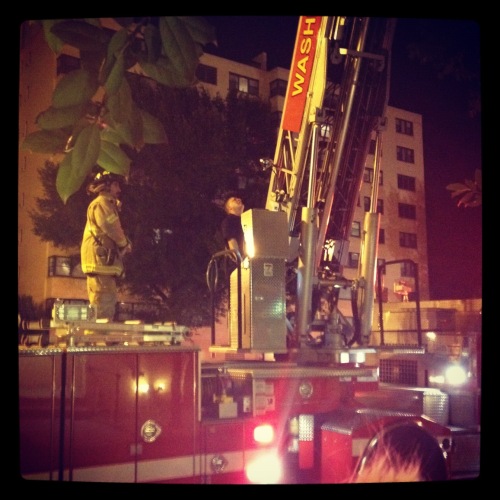
When the fire alarm went off in my building this week, I couldn’t help thinking that the experience was a lesson in how organizations can effectively handle crisis. Well, first I thought “Let’s get out of here!” but once safely outside, I considered the learning opportunity.
We’ve talked about responding and communicating well during a crisis on Frogloop before, and I know there’s a lot more to say about this challenge. Here’s what I’m thinking about:
1. Have a Plan
Emergencies happen. You can and should plan for them! People depend on your advice, programming, and services. You need a backup plan in place for those times when your work is interrupted.
- There’s never a convenient time for all four of your after school teachers to get sick at the same time, but you’ll have many fewer angry and frustrated parents on your hands if your program has substitute educators on call.
- When your museum gallery space floods during a freak storm, you know you’re in for some headaches, tough choices, and unexpected fundraising challenges as you deal with major water damage. When nature’s fury flares, you’ll be relieved that you have an existing relationship with professionally vetted art conservators that you can call on instead of also needing to research the best partner to deal with the consequences when the waters rise.
- If your only van breaks down, you’ll be thankful that you put together that list of volunteer drivers so you can get your canvassers to the neighborhoods where they need to be to get out the vote on time.
Sometimes it’s enough for your staff and board to know about the plan, and other times you need to share the plan more widely with your community. Keep in mind that you may need to bring in some outside firemen or other professionals of your own.
 Firemen and Ladder
Firemen and Ladder
2. False Alarms are Dangerous
My college dorm had a lot of false fire alarms. Every two or three weeks the halls would fill with piercing sounds and flashing lights, and we’d all shuffle sleepily outside. Sometimes the alarm was tipped by mistake or by inconsiderate and intoxicated visitors, but the system was also just plain unreliable and often went off for no apparent reason. Over time, especially when the weather got cold, students stopped hurrying outside and more people chose to ignore the alarms altogether. This is really dangerous!
Fire alarms are rare in my building, so when the fire alarm went off this week we rushed down the stairs. Don’t hesitate to inform your community about a crisis when it happens, but be sure there’s reason for concern before you ring the bell.
3. Crises Have their Own Schedule
Plan for something going wrong when it's least convenient – when half the staff is away, your boss is out of town, and when it’s too late to reach the usual contact person.
4. Communicate Early and Often
It is so important to keep your community in the loop when you are facing unexpected challenges. When the alarms went off in my building and the fire trucks arrived, the first thing residents did was call the building manager’s office where their call was received by corporate sounding voicemail.
Of course, at 12:15am it’s unlikely someone will be at your office to pick up that first call. When people can’t reach you to address the problem, you can bet they are going to talk about the issue wherever they can, likely on Twitter, Facebook, Instagram, you name it. The sooner you can alert people that you are aware of the issue the better.
- “When can we go back inside?”
- “Which floor was the fire on?”
- “Is everyone out?”
- “Will I be reimbursed for any damage to my belongings?”
- “Are we going to need to stay in a hotel tonight?”
Your community might be inconvenienced, stressed, worried, and freaked out about the organization’s future during a crisis. (If they are one of my neighbors, they’ll be standing outside trying to console a very stressed, worried, and freaked out guinea pig.) Let them know how to adjust their plans and keep sharing updates as you have more information.
5. The Hidden Impact of Crisis
Remember that your crisis has a larger impact than you immediately realize. You don’t operate in a vacuum. Your neighbors, partner organizations, and other more peripheral constituencies are also affected. The residents in the building next door are wondering when the lights will stop flashing, and whether the trucks will still be blocking the entrance to their parking garage in the morning when they need to get to work. Maybe they're worried about the fire spreading, or their insurance premiums going up because of your experience.
You are part of a larger sector of organizations addressing shared challenges. Donors and foundation staff may think about you all in same terms or put you in the same funding bucket. Funders can reconsider their future grant allocations, change priorities, or place new reporting and measurement requirements on all of your peer organizations based on the way you act in this moment. The way you respond to crisis will impact the entire sector’s reputation.
There’s a lot to more to think about. Crisis can make or break you. How are you putting backup plans in place at your organization?
Avi Kaplan is a Senior Strategist at Rad Campaign, a firm that provides web design, web development, online marketing, and strategy to nonprofit organizations and political campaigns.


COMMENTS